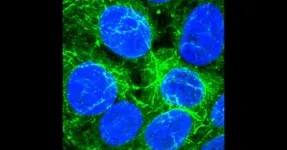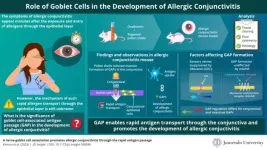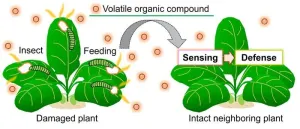(Press-News.org) (Boston)— SARS-CoV-2, the causative agent of COVID-19, began impacting the U.S. in March 2020 with many schools and universities shifting to remote education by early April 2020 in response to the public health emergency. Despite public health interventions (increased ventilation, masking policies, surveillance testing, contact tracing of confirmed cases and quarantine procedures for infected students, faculty and staff) there were still concerns that institutes of higher education would be a hotbed of transmission, including transmission from students into surrounding communities.
But, were these fears warranted?
A new study from Boston University’s COVID Clinical Testing Lab and Contract Tracing along with researchers from Boston University Chobanian & Avedisian School of Medicine, has found that public health interventions prevented transmission for most SARS-CoV-2 introductions at BU, with only two major outbreaks within the university identified from January to May 2021.
“We found that genetically linked cases overlap with outbreaks identified by contact tracing; however, they persisted in the university population for fewer days and fewer rounds of transmission than originally estimated via contact tracing,” explains corresponding author John Connor, PhD, associate professor of microbiology at the School of Medicine. “This underscores the effectiveness of test-trace-isolate strategies in controlling undetected spread of emerging respiratory infectious diseases. These approaches limit transmission from those people outside the university as well as those who caught the disease from someone within the campus community,” adds Connor who also is a researcher at the Boston University National Emerging infectious Diseases Laboratories.
Connor and his team hypothesized that the viral genomics data would support contact tracing’s finding that most SARS-CoV-2 infection on campus were singular events not linked to intra-campus transmission chains. Additionally, they aimed to identify any large outbreaks among members of the campus community and align genetically identified outbreaks with cases linked via contact tracing.
In April 2020, Boston University enforced weekly surveillance testing, social distancing, masking and prohibited school-sanctioned social events. Individuals who tested positive were isolated for ten days by moving into on-campus isolation housing or isolating at private off-campus residences. To track and limit infection spread, the university performed comprehensive bi-directional contact tracing to identify likely transmission pathways through interviews of all test-positive individuals and known contacts. This information was then coupled with viral genomic sequencing for both asymptomatic and symptomatic cases to confirm likely transmission events and spur re-investigation if genomic data suggested additional links.
Viral genomic sequencing captured 767 unique SARS-CoV-2 genotypes on the BU campus during the spring 2021 semester. Of these, they observed 696 genotypes (91%) only once, making it unlikely that they established on-campus transmission chains. The few genotypes with multiple observations usually showed transmission bubbles of less than five individuals; only seven genotypes (approximately 1%) included more than five samples. According to the researchers, these findings highlight the ability of systematic testing, tracing, and quarantine approaches to limit respiratory transmission in a complicated urban environment with repeated introduction of SARS-CoV-2 from outside sources.
The researchers believe these findings have implications for not only SARS-CoV-2 but also other respiratory diseases and show what one can expect in future outbreaks if responses are limited and lack effective pharmacological interventions. Vaccination was unavailable to most BU students and staff until March 2021, so infection control measures were limited to mask mandates, symptom monitoring, surveillance testing, and isolation following a positive test. “Our analyses support the hypothesis that systematic interventions, such as population-level test-trace-isolate strategies, are highly effective in limiting respiratory infection transmission, even in the presence of continual importation of disease from outside the university population,” said first author Jackie Turcinovic, a PhD candidate in the Connor lab.
These findings appear online in the Journal of Infectious Diseases.
BU provided financial support for the testing program described in this study and supported sequencing efforts. The BUMC Genome Sciences Institute provided financial support for sequencing. JHC acknowledges funding from BU for SARS-CoV-2 surveillance, the Massachusetts Consortium on Pathogen Readiness (MassCPR), and the China Evergrande Group.
END
Public health interventions prevented transmission within BU most SARS-CoV-2 cases
Findings have implications for transmission protocols for other respiratory diseases
2023-10-17
ELSE PRESS RELEASES FROM THIS DATE:
CastleVax Inc. receives BARDA project NextGen award valued at up to $338 million to advance intranasal NDV-based COVID-19 booster vaccine into phase 2b clinical efficacy testing
2023-10-17
CastleVax, a clinical stage vaccine platform company, has received a Project NexGen award valued at up to $338 million from the Biomedical Advanced Research and Development Authority (BARDA), part of the Administration for Strategic Preparedness and Response (ASPR) in the U.S. Department of Health and Human Services (HHS), to support the development of a next-generation, booster vaccine to protect against COVID-19 for years to come. The initial phase of the award provides approximately $8.5 million to plan a Phase 2b clinical trial that would compare CastleVax’s vaccine to currently ...
New cancer therapy target stops tumor cells from sharing resources
2023-10-17
Researchers at University of California San Diego have discovered a process in which liver cells share molecules via vesicle exchange in order to multiply under conditions that would ordinarily suppress cell proliferation. They also found evidence that this process occurs in various types of cancer cells, paving the way for a new approach to tackling treatment resistance in cancer. The findings were published on October 17, 2023 in eLife.
“Understanding cell proliferation is a fundamental issue in both cancer research and biomedical science as a whole,” said Gen-Sheng Feng, PhD, a professor of pathology at UC San Diego School of Medicine and of molecular biology ...
International team reveals source of largest ever Mars quake
2023-10-17
A global team of scientists have announced the results of an unprecedented collaboration to search for the source of the largest ever seismic event recorded on Mars. The study, led by the University of Oxford, rules out a meteorite impact, suggesting instead that the quake was the result of enormous tectonic forces within Mars’ crust.
The quake, which had a magnitude of 4.7 and caused vibrations to reverberate through the planet for at least six hours, was recorded by NASA’s InSight lander on May 4 2022. ...
The dark side of the American lawn
2023-10-17
The American residential lawn is, for many, an iconic landscape and about half of homeowners in the US use fertilizer to keep their yards green and lush. Some proportion of the nitrogen in this fertilizer enters the broader environment, with negative consequences including algal blooms and deoxygenated waters. Peter Groffman and colleagues studied residential landscapes in the Baltimore, Maryland metropolitan area, which drains to the Chesapeake Bay, seeking to identify locations (hotspots) or times (hot moments) with disproportionately high rates of nitrogen export. The authors went to lawns in exurban, ...
New study sheds light on the developmental mechanism of allergic conjunctivitis
2023-10-17
When it comes to eye allergies, the transition from allergen contact to bothersome symptoms has always been quick, appearing within a span of a few minutes. The initial stage of allergic conjunctivitis involves the penetration of allergen through the epithelial cell layer (cells covering the outer surface of the body). However, the exact mechanism underlying the rapid allergen transfer has remained a mystery so far.
Fortunately, in a new ground-breaking study published in the journal JCI Insight on October 11, 2023, researchers from Juntendo ...
Western University researchers reveal link between Alzheimer’s and sex hormones
2023-10-17
LONDON, ON., CA:
Alzheimer’s disease disproportionately affects women, who represent about two-thirds of those diagnosed with the late-onset type of the disease.
Previous research has shown Alzheimer’s is also more severe and progresses more rapidly in women, and women with Alzheimer’s experience a steeper cognitive decline – loss of memory, attention, and the ability to communicate and make decisions – compared to men with the disease.
The biological bases for these differences between men and women with Alzheimer’s disease are not well understood. ...
How to help save plants from extinction
2023-10-17
Now is the time to identify the conditions that cause plants to die. Doing so will allow us to better protect plants by choosing conservation targets more strategically, UC Riverside botanists argue in a new paper.
Published in the Oxford Academic journal Conservation Physiology, the paper demonstrates how scientists can learn the limits past which plants’ vital functions shut down, and makes the case that not doing so is a mistake in this era of increasing drought and wildfires.
“We can measure the amount of water loss plants ...
Kennedy Krieger receives $5 million grant to expand reach of its pediatric post-COVID-19 clinic and support school students
2023-10-17
BALTIMORE, October 17, 2023—Researchers at Kennedy Krieger Institute have received a $5 million grant from the U.S. Department of Health and Human Services (HHS), through the Agency for Healthcare Research and Quality (AHRQ), to expand access to comprehensive care for children and adolescents with long COVID-19, particularly among underserved populations.
During the five-year project, researchers at the Pediatric Post-COVID-19 Rehabilitation Clinic will receive up to $1 million annually to expand and strengthen its integrative services in Baltimore and the overall mid-Atlantic ...
Can lifestyle interventions benefit patients with advanced breast cancer?
2023-10-17
MIAMI, FLORIDA (Oct. 17, 2023) – Can lifestyle interventions such as exercise and intermittent fasting help patients with advanced breast cancer better tolerate side effects from treatment?
That is the question Tracy Crane, PhD, RDN, and Carmen Calfa, MD, at Sylvester Comprehensive Cancer Center at the University of Miami Miller School of Medicine and their collaborators will strive to answer with a $4-million, five-year grant from the National Cancer Institute (NCI).
Crane, co-lead of Cancer Control and director of Lifestyle Medicine, Prevention and ...
Unlocking nature's silent conversations: Real-time visualization of plant-plant communications through airborne volatiles
2023-10-17
Saitama, Japan: Plants emit volatile organic compounds (VOCs) into the atmosphere upon mechanical damages or insect attacks. Undamaged neighboring plants sense the released VOCs as danger cues to activate defense responses against upcoming threats (Figure 1). This phenomenon of airborne communication among plants through VOCs was first documented in 1983 and has since been observed in more than 30 different plant species. However, the molecular mechanisms underlying VOC perception to defense induction remain unclear.
Unveiling the Invisible Conversation
The ...
LAST 30 PRESS RELEASES:
The world’s largest brain research prize awarded for groundbreaking discoveries on how we sense touch and pain
Magnetofluids help to overcome challenges in left atrial appendage occlusion
Brain-clearing cells offer clues to slowing Alzheimer’s disease progression
mRNA therapy restores fertility in genetically infertile mice
Cloaked stem cells evade immune rejection in mice, pointing to a potential universal donor cell line
Growth in telemedicine has not improved mental health care access in rural areas, study finds
Pitt scientists engineer “living eye drop” to support corneal healing
Outcomes of older adults with advanced cancer who prefer quality of life vs prolonging survival
Lower music volume levels in fitness class and perceived exercise intensity
Of crocodiles, counting and conferences
AERA announces 2026 award winners in education research
Saving two lives with one fruit drop
Photonic chips advance real-time learning in spiking neural systems
Share of migratory wild animal species with declining populations despite UN treaty protections worsens from 44% to 49% in two years; 24% face extinction, up 2%
One in 20 babies experiences physical abuse, global review finds
Tundra tongue: The science behind a very cold mistake
Targeting a dangerous gut infection
Scientists successfully harvest chickpeas from “moon dirt”
Teen aggression a warning sign for faster aging later in life
Study confirms food fortification is highly cost-effective in fighting hidden hunger across 63 countries
Special issue elevates disease ecology in marine management
A kaleidoscope of cosmic collisions: the new catalogue of gravitational signals from LIGO, Virgo and KAGRA
New catalog more than doubles the number of gravitational-wave detections made by LIGO, Virgo, and KAGRA observatories
Antifibrotic drug shows promise for premature ovarian insufficiency
Altered copper metabolism is a crucial factor in inflammatory bone diseases
Real-time imaging of microplastics in the body improves understanding of health risks
Reconstructing the world’s ant diversity in 3D
UMD entomologist helps bring the world’s ant diversity to life in 3D imagery
ESA’s Mars orbiters watch solar superstorm hit the Red Planet
The secret lives of catalysts: How microscopic networks power reactions
[Press-News.org] Public health interventions prevented transmission within BU most SARS-CoV-2 casesFindings have implications for transmission protocols for other respiratory diseases





